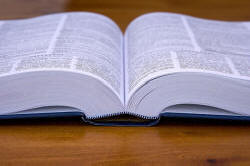Delta Module One, Paper 1, Task 2 : lexis 2

Think of a good definition of the term and then click on the
![]() to reveal some suggestions.
to reveal some suggestions.
Obviously, you won't have the same wording or examples but as long as
you are happy with what you have, that's OK.
| lexical chunk |
A short piece of language which is understood, and
can be deployed, as a single unit, often containing a
delexicalised verb.
For example, 'make the beds', 'take a bath', 'come a long way' etc. |
| word family |
A set of words related by meaning but falling into
various word classes.
For example: happy, happiness, unhappy etc. |
| mass noun |
Also known as uncountable, such nouns are generally
not used in the plural, cannot be preceded by the
indefinite article and refer to quantities of something
unless modified by partitives such 'a piece of'.
For example, 'sugar', 'money', 'furniture' etc.
|
| cognate |
A word which has a parallel in another language due
to shared etymology.
For example, 'land' in English has the cognate 'Land' in German. |
| denotation |
The core meaning of a word with no added emotional
or personal connotation.
For example, 'pig' describes a farm animal bred for meat production. |
| compound verb |
A verb formed from two or more other words and
considered a single concept.
For example, 'wind' + 'surf' → 'He windsurfed all the way to Margate'. |
| function word |
A word which performs a grammatical function rather
than carrying lexical meaning.
For example, articles, conjunctions, determiners rather than nouns, verbs etc. |
| inflexion |
A change to a word, usually a suffix (in English),
which denotes tense, aspect or number.
For example, plural -s endings, 3rd person -s, -ing etc. |
| corpus |
A large, computer-based collection of stretches of
discourse which provide real data for the study of,
e.g., collocation and colligation and for lexicographers.
For example, the Cobuild Bank of English Corpus. |
| Paper 1 revision test index | next exercise |
